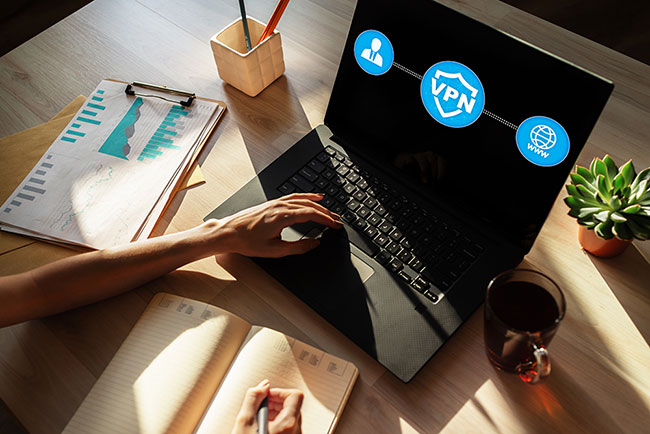How to secure data when working from home
Phishing attacks are on the rise. Companies are struggling to create the best security solutions in the wake of an outbreak and people are forced to work remotely. Experts say that the lack of preparation will lead to a huge number of data leaks.
So what can you do to make sure your work data is not stolen or leaked? Here are some tips from network security experts.
Set up VPN
A VPN, or virtual private network, allows users to send and receive data on a public server as if it were secured on a private server.
Heather Federman, vice president of privacy and policy at cybersecurity firm BigID, said: 'Make sure any communication uses the VPN client, as well as making sure that the Your home appliances are protected and secure. '
 Set up VPN
Set up VPN Stop using weak and similar passwords on many devices
Make sure you do not have a password of type 'password123' or a similar non-secure sequence of numbers. Weak passwords make you especially vulnerable to hackers targeting your home network.
"Make sure you have good protection on home WiFi networks, mobile devices and desktop computers," said Alan Snyder, CEO of NowSecure. 'Change the default password and user ID, use a strong, long password, use the password management system to remember these long passwords and ensure a high level of security is enabled in the browser' .
Do not make yourself a victim of scams!
Don't open strange emails or click on links in those emails, even if they look like they come from a trusted source.
James Carder, LogRardi's security director, said: 'At a stage like this, attackers know that a pandemic is the subject of public interest. People often look for things like COVID, pandemic, Corona virus. Consequently, an attacker would buy multiple domain names and pretend to be Centers for Disease Control and Prevention, World Health Organization or local authorities. You need to be aware of what you're clicking and where it takes you. '
 Do not make yourself a victim of scams!
Do not make yourself a victim of scams! Talk to the company's IT team
Contact anyone responsible for the software infrastructure in your company.
Eric Bednash, CEO of Racktop Systems, said: 'Talk to anyone in charge of this area to find out what you should do, or what is the best solution.' Bednash emphasized: 'IT professionals still know these things, even if they are not security experts. IT professionals are generally knowledgeable enough to know what you should and shouldn't do. After that, all you need to do is try to adhere to the policies they provide. '
If you are running a company, you must understand the workflow. Security must be at the forefront when you think about productivity and resource availability.
Large security websites like ForgeRock, NowSecure and Cisco all have their own recommendations for the best security applications and solutions for businesses and employees to check at their websites.